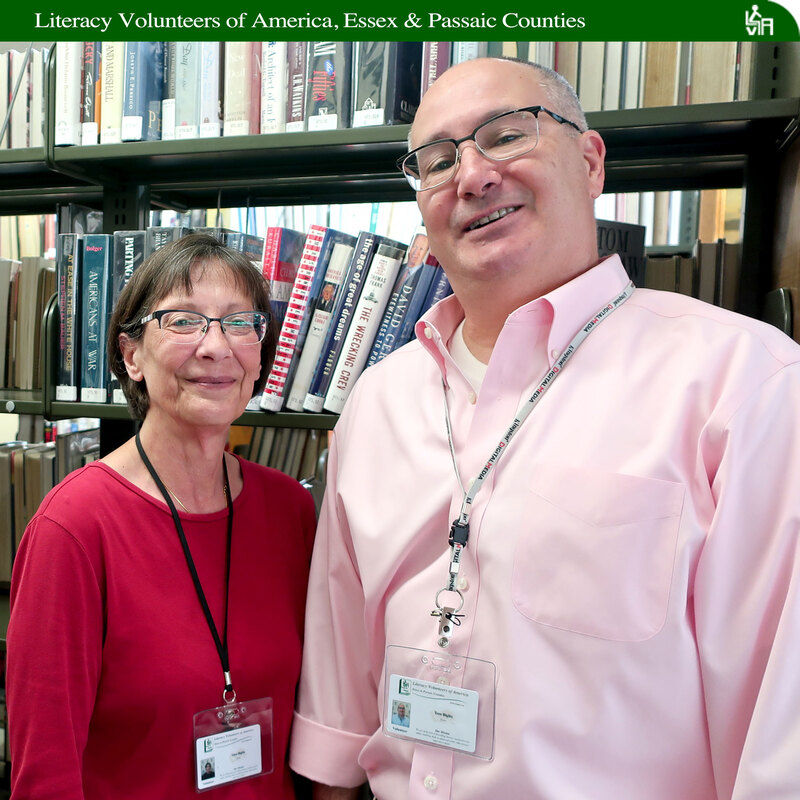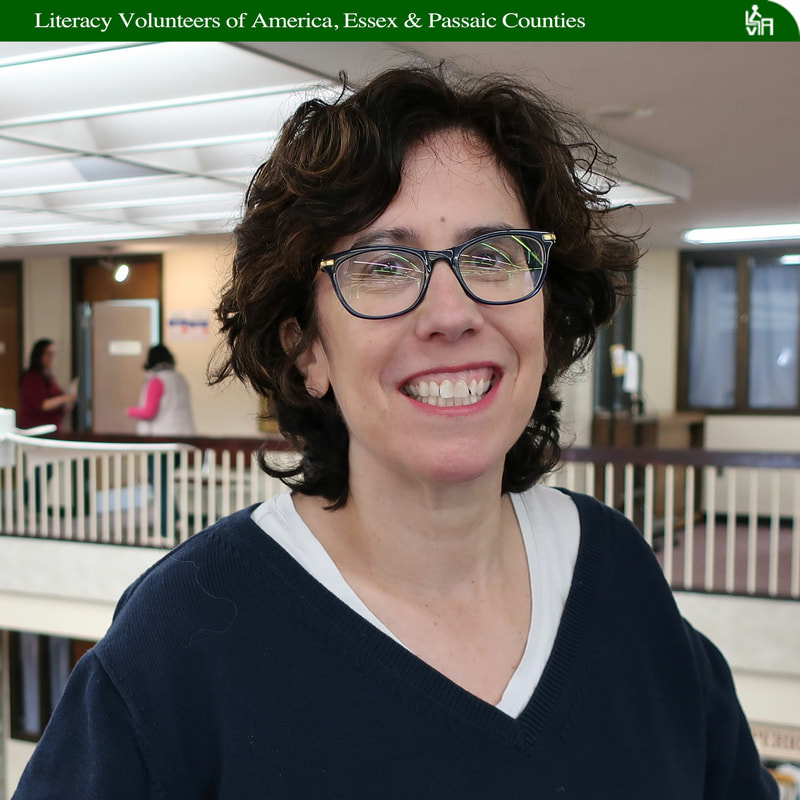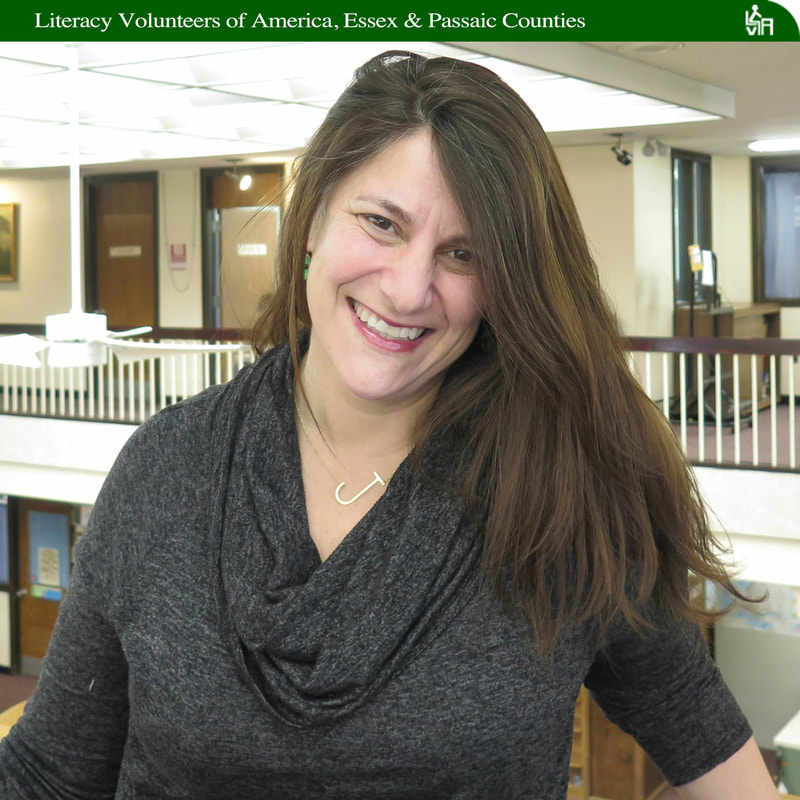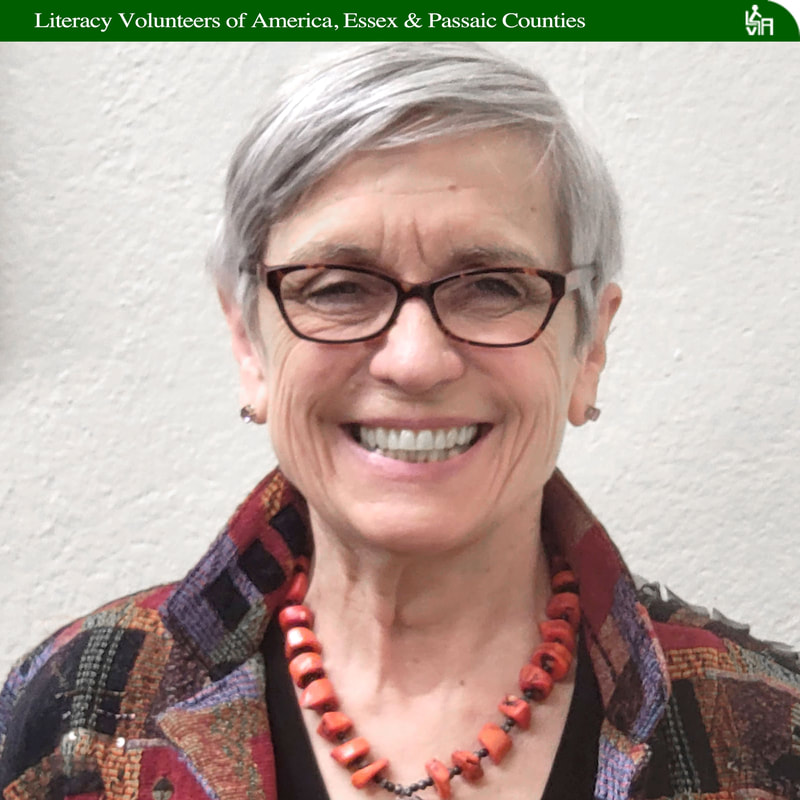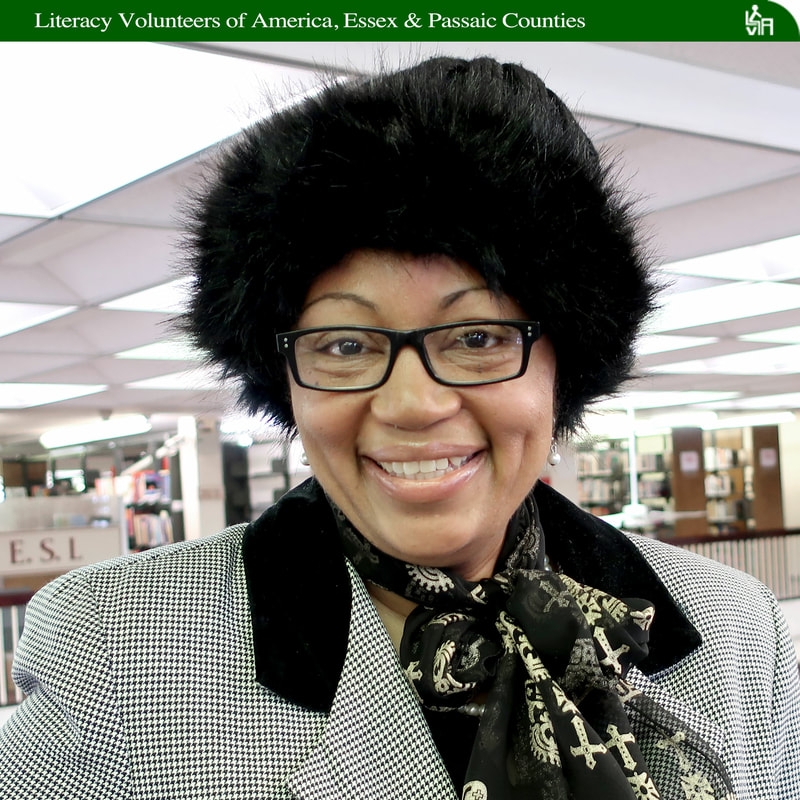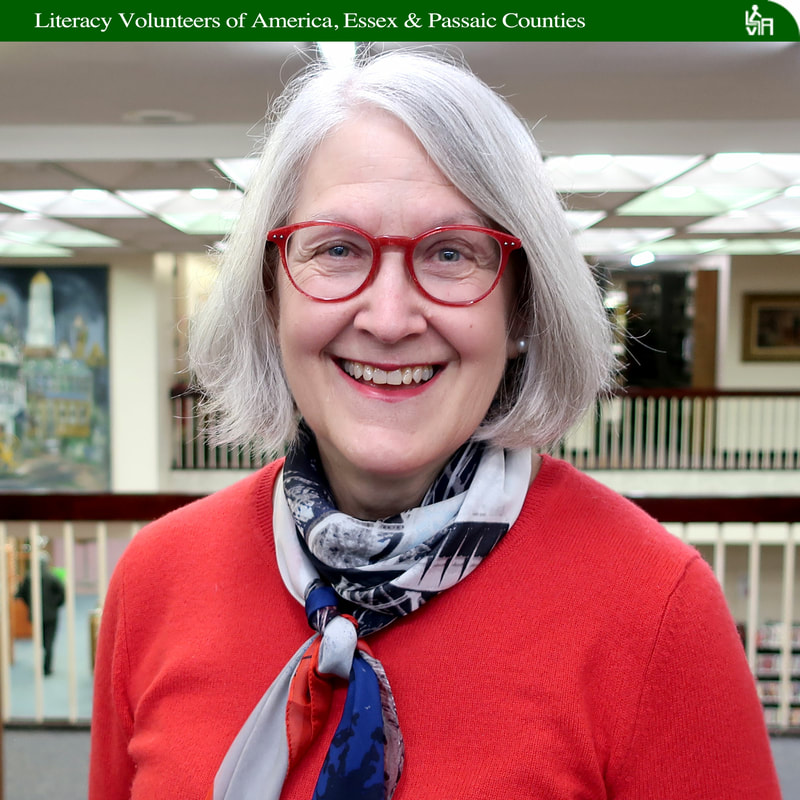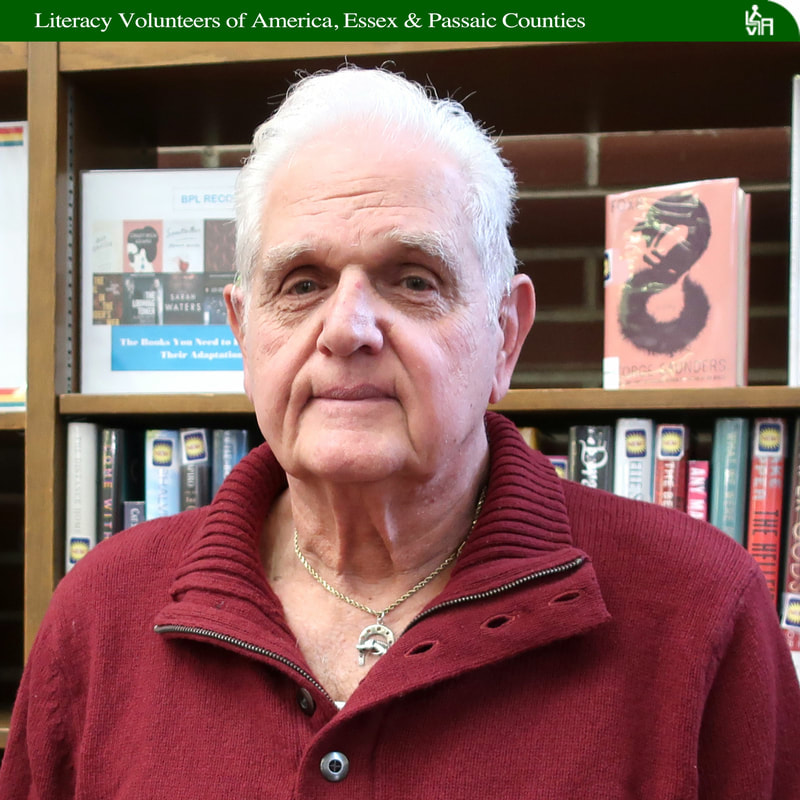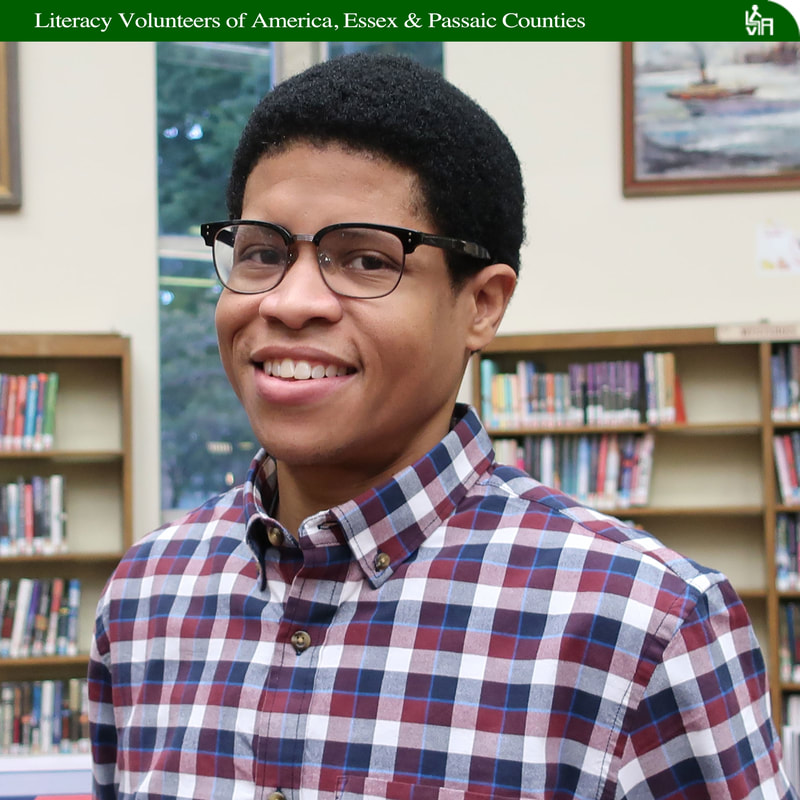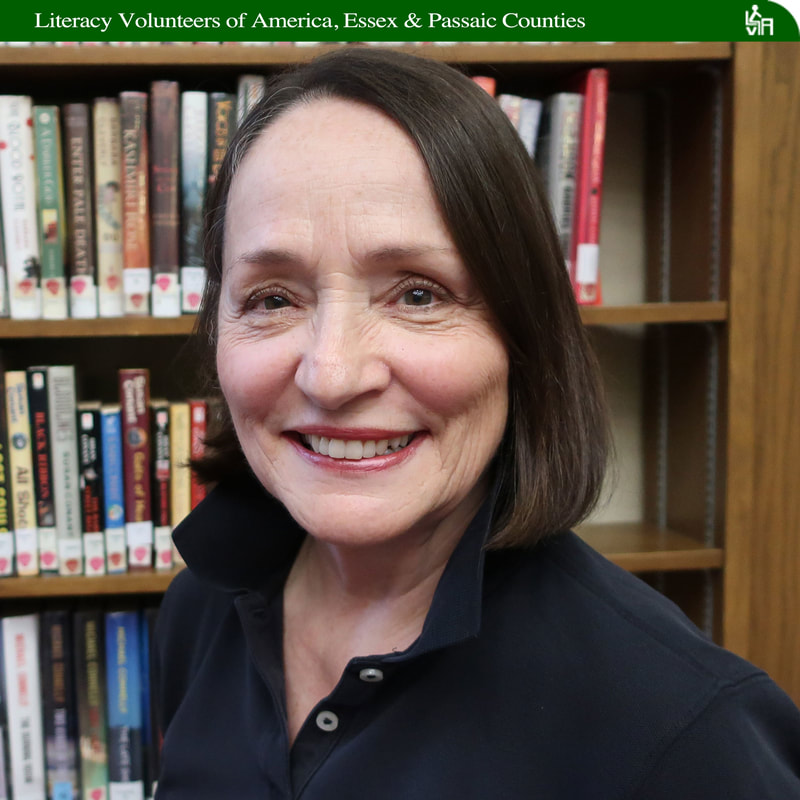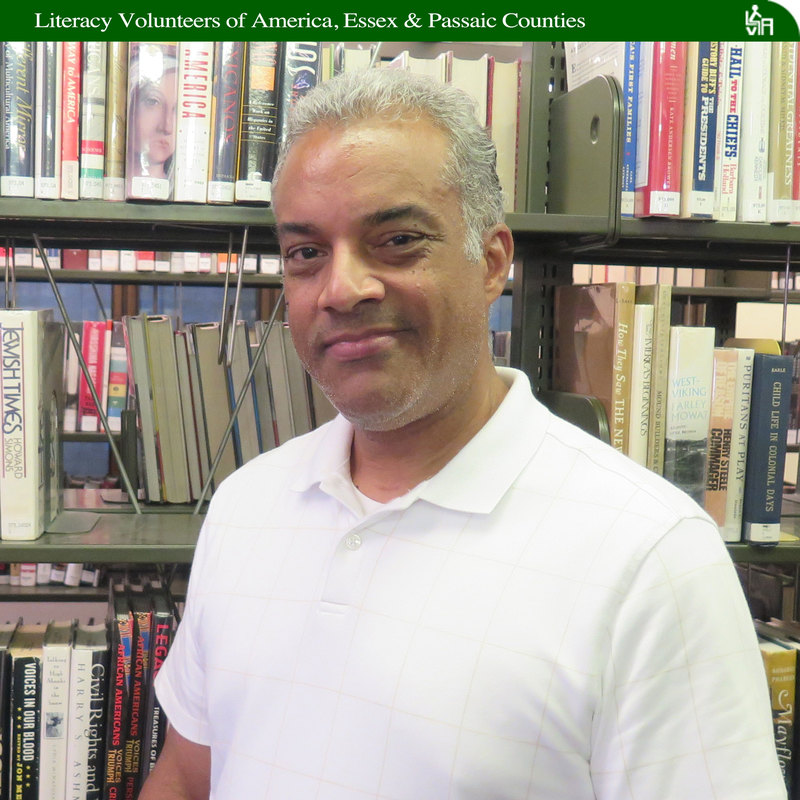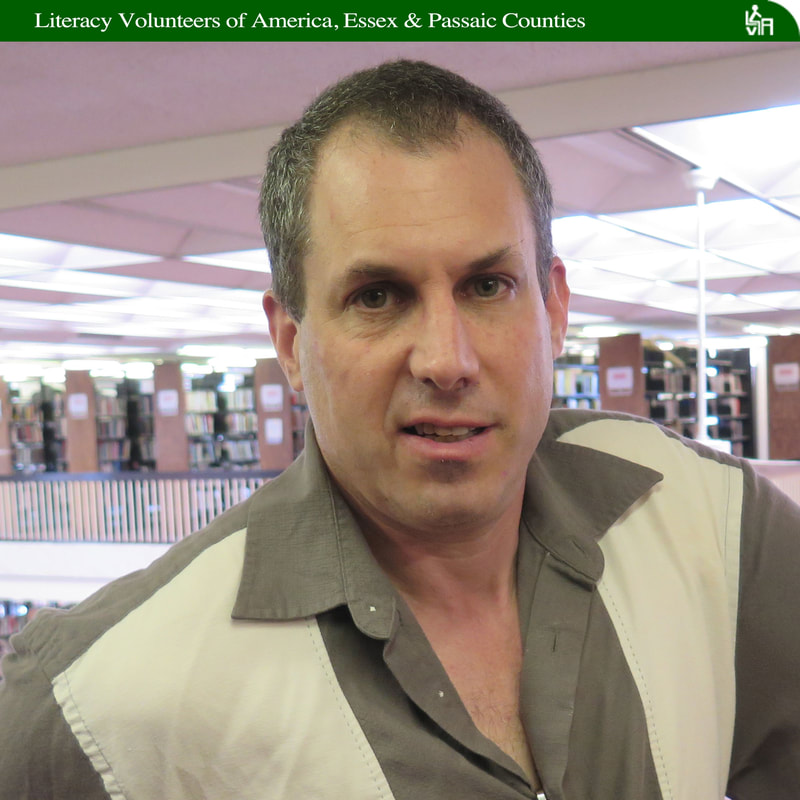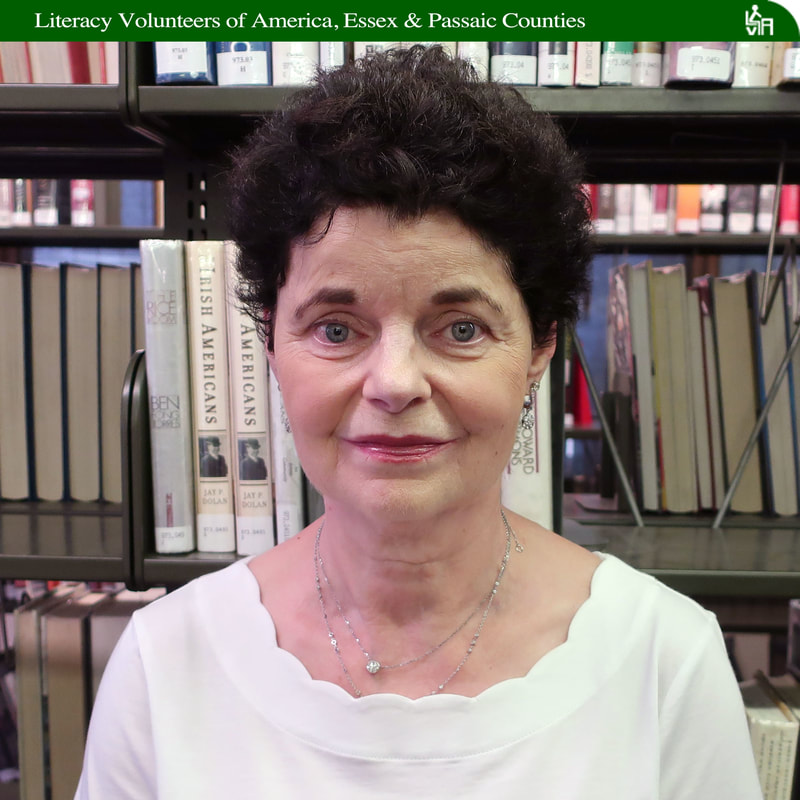Volunteers' Stories 2018-19
Everyone has a story, unusual, exciting, different. Many of them are just waiting to be read by others. From the front lines in Bosnia to the front office in Manhattan, Literacy Volunteers of America tutors come to us with fascinating backgrounds. We are proud to share the highlights of these amazing individuals who bring their varied experiences to our students.
Enjoy reading about people like the former missionary who provided medical supplies to remote villages, retired business people, lawyers, healthcare providers, college students, building for the future, who generously share their wealth of newly acquired knowledge, and even mothers whose role as primary as caregiver for their children willingly juggle home life, work as well as tutoring.
Enjoy reading about people like the former missionary who provided medical supplies to remote villages, retired business people, lawyers, healthcare providers, college students, building for the future, who generously share their wealth of newly acquired knowledge, and even mothers whose role as primary as caregiver for their children willingly juggle home life, work as well as tutoring.
Tom and Gina Biglin
It takes more than a bit of skill to make this team: It requires commitment, enthusiasm, and a general concern for adult literacy students. Workouts occur every Tuesday.
They are known as “Team Tuesday”, a growing number of Literacy Volunteers of America tutors who meet their students at the Bloomfield Public Library, as the name suggests, on Tuesdays. The team was named by Gina and Tom Biglin, a married couple of volunteers who wanted to describe the friendly spirit and supportive nature of the tutors who meet with different groups of students on the same morning each week. As for Gina and Tom each had each spent 35+ years working in corporate America. But they didn’t want to spend their retirement years just sitting around. “We retired with a goal of volunteering,” Tom said. “We took the Master Gardeners of Essex County course and have been volunteers there. However, we wanted to do something more directly beneficial to help people in the area.” With a little bit of research they found opportunities that led them to LVA which, as Ellen said in her usual friendly fashion, made “us feel comfortable and useful“. “It is a great program,” Tom said. “We can do it together and it seems like the perfect fit. Trainer Mary Kao was great. The other trainees were as nervous as we were.” “You have to break out of your comfort zone,” explained Gina. “We have been very fortunate and feel we want to help others. We know that reading, writing, and speaking are critical skills to all and want to help out with those who want to better communicate.” “There are libraries everywhere and LVA gives us the opportunity to be flexible with our time,” added Tom. The couple said that one great thing about working together is that they can think out loud about the program both before and after their tutoring sessions; sort of like a team within a team. They bounce ideas for lessons off of each other. They ask each other questions such as “Is this too much or too little? Is it appropriate or too pedantic? I can’t think of how to teach this concept. Do you have any ideas?” “When things go well and you are excited, you can share with someone who understands the satisfaction of seeing a student own it,” Tom said. Tom tutors four ESOL students and Gina tutors one Basic Literacy student. She had an ESOL student that returned to her home country. A Basic Literacy student overheard Gina tutoring her former student and stepped in as soon as the student left. He said, “I want to study with Gina.” “The buddy system of lesson planning has been good for us,” said Tom. “We are not procrastinators. We each are doing our own thing but we are on the same page.” |
Jennifer Fidlon-Bugat
LVA tutor Jennifer Fidlon-Bugat knows the struggles immigrants face all too well. “My husband is a French immigrant to the United States and we moved here almost 23 years ago. ESOL has personal meaning to me,” Jennifer said.
This art history, French literature major, and former lawyer met her future husband when studying abroad in Paris. Jennifer has always been very socially conscious. “I have tried other forms of activism, but I wanted to take more concrete action,” she said. The 2016 election was her tipping point. Along with volunteering with First Friends, an organization that helps immigrant detainees, Jennifer sought out Literacy Volunteers of America, Essex & Passaic Counties. “I was looking for a way to volunteer my time to be responsive to the policies I thought the new administration was starting to implement toward immigrants,” Jennifer said. She has worked with many students during her 2 1/2 years as a tutor. And, in that short time, her successes are plentiful. Shalga, a native English speaker whose education was very limited, now in her mid 70’s, is going back to school to get her GED. Jennifer found writing prompts to be the best teaching tool to address Shalga’s learning style. “At the beginning, Shalga only wrote a few sentences, which in time, turned into several paragraphs,” Jennifer said. Next, Jennifer’s group of four women, started to write a story. “Everyone would contribute a sentence or two to keep the story going.” Jennifer added, “I was excited to see the ESOL students get more comfortable to speak and write in English about their hopes and desires.” One of Jennifer’s current students, a Haitian native and nurse in her country, with Jennifer’s help, just earned her home health aide certificate and is now gainfully employed. Jennifer’s native Spanish-speaking student is well on her way to testing out of the LVA program. “I love volunteering,” Jennifer said. “It has been one of the most positive things that I have done in the past few years. I love getting to know my students. I am grateful to work with these people who have optimism for the United States. To interact with people who have such hope is very special. I honestly think I get more out of our tutoring session than my students,” Jennifer said. |
Jillian DiGiacomo
One word that best describes LVA tutor Jillian DiGiacomo is proactive. Whether it is encouraging people to be their best selves, or empowering her LVA students with the tools necessary to move their lives forward, one can bet Jillian has a plan.
Jillian remembers the day she signed up for LVA’s tutor training workshop. “It was November 9, 2016,” she said. “ I became involved due to the current political situation.” Jillian had previously been an LVA tutor in 1991 when she was a college student. She offered great support to a Vietnamese family. “I also worked as a fundraiser for several New York City charities. I was fundraising for some really cool things and then I decided I wanted to DO those cool things.” Some of the “cool things” Jillian did was graduate with a degree in Asian studies from Vassar College and receive a master's degree in teaching from Harvard. Before having children, she spent most of her time either teaching English in Japan or teaching Japanese to high school students in New York. A self - starter, Jillian built her curriculum from scratch. Tutoring at LVA, Jillian says, “I feel like I am back in my wheelhouse. The ability and need to communicate is human and the ability to help facilitate that is a gift,” she said. Jillian’s recipe for successful teaching is to enable her students to take ownership of their learning. All of her lessons are activity based using cards, pictures, clay, or other manipulatives. One of her students just got his driver’s license and earned his boiler room certification within one year. He is currently taking a course in refrigeration that he feels confident he will pass. “Together, we figured out a great routine as to how to approach his learning style.” Jillian’s drive came to her at an early age. “My father never let me win but he always taught me how to play better, think smarter and want to win. It never crossed his mind to exclude me. Why would he? He wanted to play and I was always willing and able to join him. Simply by including me, by not telling me that I couldn’t or shouldn’t participate, my father taught me to stand tall. I grew up never questioning my own right to pursue any of my dreams and I never feared the hard work it took to achieve them,” Jillian said. Along with teaching, tutoring and raising two children, Jillian is also a writer. Her first novel, “Codename Cupcake,” is about a stay at home mom, zapped by an enhancement ray, recruited by a super spy agency to infiltrate the PTA. The Midwest Book Review wrote, “a deftly crafted and absolutely entertaining satire that reveals the author to be an extraordinarily gifted storyteller with an impressive gift for wit and humor.” Jillian’s children’s book, “Off the Wall,” which was published in 2011, is maybe even more relevant today than when she wrote it. The theme is simply “don’t let others define who you are. Always be yourself.” Critics stated, “This magical and funny story twists and turns and touches upon important themes of self-image and friendship.” “Off the Wall” was inspired by Jillian’s wish that her own children always follow their hearts. How does Jillian find time to accomplish so many various projects? Because it has never occurred to her that she couldn’t. |
Olga Roberts
When Olga Roberts took on the role of volunteer literacy tutor a year-and-a-half ago she, like most, started slowly, with a single adult student. In time, she began to ask “How can I best help?” And the answer, of course, was to take on more responsibility. So, she did.
Within little more than a year, Olga began helping nine adult students, meeting with them in small groups for 10 hours per month. That was an incredible time commitment, for sure, but Olga didn’t stop there. When no one else would, she volunteered to take on a class of eight adults, in the long-term absence of their regular tutor, rather than watch the group break up and enter the pool of students waiting for help. Olga’s role is not limited to helping students. She also mentors tutors, through an in-house group of volunteers that relies on her support. Commitment and confidence are important qualities of the volunteers that non-profits like ours rely heavily on. Olga possesses both. That can be said of tutors, as well as of students, particularly adult students who, while trying to learn a foreign language, feel that they don’t know enough to express themselves in the language they’re learning. Sometimes they simply are reluctant to initiate a conversation. They don’t necessarily lack knowledge, only confidence. So how do we, as volunteer educators, get them talk, to break the ice? It can be as simple as playing catch, according to Olga. Olga often starts off class with a warmup exercise. For example, she’ll toss a paper ball in the air and the student that catches it has to recite a new vocabulary word. There’s no repeating the words of other students or words from last week’s class. It has proven to be a popular game, one that’s fun and helps students work towards their goals of expanding their vocabulary while overcoming their fear of speaking. She also gets students chatting by asking them to describe their hometowns and native countries. Although English is Olga’s mother tongue, she has first-hand knowledge of the immigrant experience and the adjustments most undergo in their adopted countries. A native of Leeds, England, she spent her childhood interpreting for her Ukrainian born parents. She also spent time away from her family, first in a group home for children when her parents fell ill and, finally, at age 14, when she was sent to live with an aunt in Little Falls, New Jersey. Adjustment and flexibility are survival skills she developed as a youth; as an adult they are skills she brings as a volunteer tutor. She has a bachelor’s degree in English Literature from Rutgers University and has a diverse working background, having labored as a cook, as well as in other jobs, before spending 20 years as a real estate sales agent. Last year Olga enrolled in a college TESOL program at The New School. The program allows students three years to complete all requirements; Olga aims to finish in one. With her drive and enthusiasm, there is no doubt that she will meet her goal. |
Sherri Smith
LVA tutor Sherri Smith has always cut a glamorous figure when meeting with her students or attending a tutor support workshop. She’s filled with a quiet determination to help her ESL and basic literacy students succeed. She also knows the hard work it takes to learn a new language.
Sherri, a New Jersey native, speaks fluent business French and worked in France as an international business woman. You can see the flair she brings to her style with hats, scarves and accessories that appear to be a combination of her time in France and her parents’ attention to their own style. That great attention to detail also shows in her tutoring with LVA. “I enjoy when people learn something new and get that smile on their face,” her own face breaking into a sunny grin. Sherri volunteered as a tutor in Washington D.C. before moving back to New Jersey and joining LVA in 2014. She’d seen a student flyer and had a hunch LVA might need tutors too. Sherri was right and she’s a pro, using sight words, sustained reading, learner experience stories and role playing with her students Freddie and Ana. “I enjoy the sight words the most,” she says. Sight words help her give her students examples they can use in their daily lives and allow them to participate in the lessons too. “I’m also glad I have an opportunity for the student to be empowered and motivated through literacy,” Sherri said. Sherri brings a business perspective to teaching, she’s very organized, uses process and is extremely professional in all her dealings. After studying business finance in school, she went on to work for Prudential and Dean Witter. To break the ice with her students, Sherri starts each week by asking how her students are doing. She also finds giving them a short break to stretch their legs or use the restroom goes a long way toward a successful tutoring session. In her spare time, Sherri likes to check out the New Jersey food scene. Jimmy Buff’s in West Orange is a favorite with Italian hotdogs, cheese steaks and their Fat Tuesday deals with sausages two for one. She also likes the Ironbound section of Newark with the rodizio style meats that are carved tableside. If Sherri had a superpower, she would grant world peace and literacy throughout the world. Giving to others is a tenet of her life. “I believe in helping people out, that’s at the core of my being,” Sherri said. “That’s why LVA is such a perfect match for me.” She sponsors a young girl through Children International. For her recent birthday, she bypassed gifts and instead Sherri raised money for the child. As for what her students have taught her, Sherri doesn’t hesitate to tell me. “I’ve developed more patience as a tutor,” she said recalling times a student couldn’t make a class. “One student had an operation, and another had a daughter (that needed attention),” she remembered. |
Starr Baum
When feminist activist Gloria Steinem was busy laying the groundwork for Ms. Magazine, LVA tutor Starr Baum was dreaming of a completely different path, her Mrs. degree.
Starr hoped to follow in the footsteps of her beloved mother. “I was a person who thought going to college was getting an Mrs. degree. This was in the late 1960’s. My mother was in graduate school when she met my father and in three weeks married him. They were married over 50 years. My older sister married the day before graduating from college,” Starr said. Starr’s path did not follow the exact trajectory of her female family members, but close. She attended college and earned degrees in education. “It was then,” she said, I eventually got my Mrs. degree. As a matter of fact, I earned two,” Starr said with a sheepish grin. The first one lasted 11 years and my second Mrs. degree I have had for almost 28 years.” Along with being happily married, Starr is happily enjoying being a tutor. She has taken the expertise she learned from a 43-year teaching career in early childhood education where Starr taught young children how to read, and put it to work with her adult LVA students. Starr found out about LVA while exploring volunteer opportunities in Essex County on the Internet. Fortunately for us, and for her, there was only a short gap between her discovery and an upcoming training session to become an LVA tutor. When asked about the 18 hour LVA training, Starr said, “It reinforced everything I had already been applying in my teaching career.” Starr added some of her own tips as well. She said, “First, get to know your students. My first student, a woman from Mexico, had no vocabulary at all in English. I brought in pictures, a calendar, crayons, and also used gestures (Total Physical Response) to build vocabulary.” Another one of Starr’s students was a native born English speaker who never had the opportunity to attend school due to dropping out in third grade to help his family. As a teacher, Starr used Language Experience Stories with which she also became reacquainted in her LVA training. “I find that adults bring so much personal interest stories about their lives that can be incorporated into their lessons.” Starr is proud to be an integral part of the LVA family. “Being an LVA tutor makes me aware of individuals who just need our help,” she said, “and I am happy that I am able to use skills that I have used throughout my life in teaching.” While Ms. Steinem is still out there advocating for women’s rights, Mrs. Baum is advocating for people of all genders by empowering them with the right to education. |
Bob Bounczek
For nearly three quarters of a century, Literacy Volunteers of America tutor Bob Bounczek has been charting his own course. Now, he helps others chart theirs.
With his wry sense of humor, Bob said, “I came into this world a long time ago at a very young age. I am old enough to know what to do and young enough to still be able to do it.” Growing up in a middle-class household, Bob started his early working life in warehouses. “I realized that whole environment was very familiar to me. I eventually became a warehouse manager,” Bob said. Bob’s natural curiosity and sense of adventure, which has always been front and center in his life, led him down his own path. “I realized I didn’t want to be on the clock anymore,” he stated. “I went for help in making a resume, and learned to craft my own. After typing my name and address, I added, ‘I get the job done.’” And that he does. Whether it is in his former position as a warehouse manager who set his own hours, or as a tutor, Bob is your go to guy. “I manage people and situations. I solve problems,” he said. One of the first problems Bob solves in his two days per week, three hours per day English conversation class is putting his students at ease and creating a safe environment in which they can learn. Bob admits to his students that his English is not always perfect and he is still learning as well. Bob shares with his students his story of growing up in Newark and attending Catholic school. “When the nun was teaching English, I looked out the window and wanted to be involved in the action in downtown Newark,” he said. With all baggage left at the door, Bob has what he calls a “common sense” approach to teaching. He understands that the older a student is, the harder it may be for them to learn a new language. Bob simply states, “If you come from a Spanish speaking country, your computer is full of Spanish. The computer is all filled up and it has to be reprogrammed.” Bob added, “We also have to understand the difficult barriers English Language Learners face. Do you as a native English speaker have to tell your tongue where to go? The tongue has a mind of its own. Now, as teachers, we have to help our students reprogram their tongues.” Topics in Bob’s class range from the economy to civility. “I try to give students insight into who we are as a nation. It opens up your mind to see what kind of problems people face and encourages people to be more understanding of one another,” Bob said. Bob currently teaches a large group of students of varying ages and backgrounds. “I want everyone to feel comfortable using the language. That is what I strive for in the class. Don’t be afraid to make a mistake,” he said. “And,” Bob added, “If I don’t know the answer to a question, I tell my students that I don’t know. Find out the facts. ‘Why’ is a question you should always ask.’” |
Dean Garcia
Dean Garcia works full time at an exposition company managing their IT infrastructure. “I like to say, ‘I am your IT guy. I keep everything going behind the scenes.’”
And keeping everything going behind the scenes is exactly what Dean does with his Literacy Volunteers of America Essex & Passaic Counties students. Dean has only been a tutor a little over one year and what an impact he has made in that short time. Dean tutors a group of five women from various backgrounds who come together every Tuesday night with one common goal: to improve their English. “I have a couple of students that will test out of the LVA program this year,” he said. “When one of my students started, she could barely understand English. Soon, she will be leaving us. She has really excelled. She stated that she is very happy but a little sad at the same time. That is always great to hear.” Dean found out about LVA from where else, but Google. “I was looking on my computer for great volunteer opportunities in Bloomfield, New Jersey. I read about the program and it sounded like they were doing some pretty worthwhile stuff. I thought maybe I could, too.” Dean soon signed up for training and recalled that he “thought it was pretty overwhelming at first, but since working with the LVA office, and receiving such wonderful support, I felt a little more comfortable.” Prior to coming to LVA, Dean graduated from U Penn with a degree in sociology. Over a decade later, he was able to put what he referred to as ‘soft skills’ to work. The needs of the students captured Dean’s heart and mind. “They really want to learn,” Dean said. “That motivated me to be a good tutor.” Dean added that he is happy that LVA students feel safe that they have a place where they can practice their English skills.” As far as his part in supporting his students, Dean sees himself as an “over preparer.” “I will come in with not just this week’s lesson but next week’s lesson as well. But, I always like to stay flexible and let the students dictate where the class goes and see how it best benefits them.” Dean smiles as he recalls an early tutoring session. “I remember my very first class,” he said. “I got a couple of yawns. After listening to the students tell what their goals are, I try to be flexible and listen to what they want and tailor lessons to their needs.” Dean sees LVA as a place with a “welcoming environment that offers the students reassurance.” He added, “The students feel reassured that the commitment they are putting in gets reassured by the commitment of the tutors. It is a family.” Based on his commitment and the students’ success, Dean now knows that LVA is doing some “pretty worthwhile stuff.” |
Ann Moore
LVA tutor Ann Moore has always had a knack for furthering potential. Whether it was in her working life at Coldwell Banker that has approximately 3,000 real estate offices in 49 countries, or in the Bloomfield Public Library with her 5 students.
She now gets the same satisfaction from tutoring that she did when she helped first time buyers realize their dreams of owning their own home. In both arenas, Ann said, “Helping people is very rewarding.” Ann discovered LVA after she had just retired from 32 years as an agent and later branch manager for several different Coldwell Banker offices. “I was newly retired and looking on line at different volunteer options,” Ann said. “I had thought about the need for literacy tutors before I retired. I looked it up in the spring and the class was in October. I retired in June and took the tutor training in October. The timing was just right, as we travel in the summer.” “When I left training, I was terrified I was not going to do the right thing. I felt I had such a responsibility because the students were giving so much of their time, and I wanted to make lessons worth it for them,” Ann said. “I spent many hours getting ready for my first meeting. I was so nervous about it. The first lesson, I was as nervous as my student. My nerves subsided after a month.” Ann now tutors five students. “I like working with a group. I find it much easier,” she said. “The activities are more fun. There is more interaction. The students are more playful and friendly with each other when there is a group. They are very friendly and supportive of each other.” Ann feels strongly about LVA’s mission. “In a political climate where there is so much angst over immigrants, this is a program that is on the positive side of the immigration story,” she stated. “The students make a personal commitment to tutoring considering they work long hours and have family commitments. It is such a viscous cycle. If you can’t learn the language, you can’t improve your life conditions,” she said. “I am impressed with how seriously they take the program.” Ann, with her knack for furthering potential, concluded by saying, “I am also impressed with the commitment the tutors make to their students. It is not just the time in the tutoring sessions, but the additional time spent in the professional development and tutor support groups to learn how to better help their students.” |
Daniel Mevs
Daniel has made a career of improving lives. Now he does it in his spare time too.
Daniel joined Literacy Volunteers of America, Essex & Passaic Counties almost a year ago and has already made a difference in his students’ lives. One of his students has made a job change and gained more stable employment. The other is ready to tackle the workforce head-on. His tutoring technique has been successfully using sight words. Each week, one can find Daniel in the Bloomfield Library carefully going over his list of words before his two Jamaican students arrive. He prepares flashcards for them and every two weeks the students receive a new list. Of course, Daniel is evaluating their progress during the entire lesson to determine if they are ready for a new list. He said, “It works very well and gives my students something on which they can really focus. They are pleasantly surprised that they know more than they think they know. In both students, I have definitely noticed confidence when it comes to reading and they are more comfortable learning new words.” Each has progressed exponentially since they joined LVA. Daniel began his professional life in pharmaceutical and medical services. A Buffalo native and Ohio State University graduate, Daniel’s first job out of college was as a store manager at Kroger. This was not satisfying to his soul nor his lifestyle. Daniel’s desire for a job change led him to Baltimore, where he was hired by Bristol Myers Squibb and worked for 10 years. Daniel laughs when he recalls his first job at Squibb working in dermatological medications. The messages left for the emergency line for dermatologic emergencies sometimes had the office laughing. “Oh, I am having an emergency. I am getting married tomorrow and a pimple popped out.” Of course, Daniel was aware that an emergency may be a severe rash, a beginning sign of anaphylaxis, and he took each call very seriously. Daniel’s real passion for pharma and its life saving properties began when he moved to New York City in 2003. At this time, HIV patients were looked upon as pariahs. Upon his entrance, to a clinic, Daniel saw chairs being scrubbed and sprayed down with Lysol. Daniel was infuriated. He sought out the opportunity to promote HIV medications. He was quickly promoted to district manager. Daniel was fascinated by the science behind the development of HIV medications and wanted to learn as much as he could about the disease state. He saw this as a chance to play a small role in saving some people’s lives. “New therapies were constantly emerging,” Daniel said. “I have seen HIV go from being a death sentence to an asymptomatic chronic condition. People are more likely to die from a heart attack or cancer than HIV.” Daniel is currently employed as a hospice liaison. He has gone from assisting patients whose chances for long term survival were risky at best, to those who have a terminal diagnosis. Daniel’s calm demeanor and reassuring smile helps put people at ease. He also wants people to know that hospice care is a benefit of Medicare. For terminally ill Medicare beneficiaries who do not want to pursue curative treatment, Medicare offers a comprehensive hospice benefit covering an array of services, including nursing care, counseling, palliative medications, and up to five days of respite care to assist family caregivers. Daniel emphasizes the importance of quality end of life care. “It helps individuals to be more comfortable at the end of their lives by providing nursing care, pain management, and social services. I enjoy this position because it brings me closer to the patients.” |
Dan Barenholtz
If LVA tutor Dan Barenholtz’s heart was any more open, it would be turned inside out.
He leans out into the world, trying understand new cultures, new languages, meet new people and do his part to make less fortunate empowered. “Language is intrinsically related to culture,” Dan said. “It is like a keyhole in the door. It opens me up to different ways of thinking and being.” Dan was born in Brooklyn Heights and moved to Montclair when he was three-years-old, also the age he learned to read. In Montclair, he started learning Latin and took out a book on Swahili in first grade, already leaning into the world.He stayed in Montclair’s public schools until 7th grade. Then his adventures really began. When China first opened its doors in 1982 to Americans, Dan went on a tour to China, Japan and Hong Kong when he was 12-years-old. Along the way, he struck up a conversation with an elderly Japanese man who taught Dan some Japanese. “I almost missed my flight because of that,” he remembered. For schooling he went to Montclair Kimberly Academy, a Quaker boarding school in Pennsylvania, and Dublin School in New Hampshire before graduating from Montclair High School. Dan then graduated from Bloomfield College with a Bachelor’s degree in sociology, magna cum laude. Now Dan speaks French and Spanish and compares the same nouns in English. “In English we don’t think in terms of masculine nouns and feminine nouns,” he said. “These are slightly different nuanced ways of thinking.”Dan studied Russian in 2007. His sense of adventure includes the United States too. Dan has driven across the country and back twice and loves the area near the New Mexico and Arizona border, where he met a French couple and was able to use his French. “If we mandated at least one or two foreign languagesin the United States, it would go a long way toward world peace,” Dan said. With his students, Dan draws on common sense to judge their level of English. “If they don’t have a foundation, we start on the alphabet and then the most commonly used words,” he said. |
Joan Marren
|

